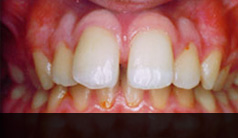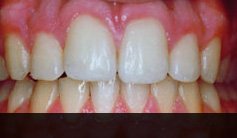Orthodontics is a specialised field of dentistry. Specialist Orthodontists are dentists who study for an extra three years to attain the necessary qualifications and experience. Orthodontics is the study of growth and development of the teeth and jaws and treatment to provide a pleasing smile and good functioning teeth.
Straight teeth are easier to clean and will aid in saving your teeth for life. A good bite will preserve the integrity of the tooth enamel and prevent jaw joint problems. A pleasing smile is important for your well-being and will give you the confidence to achieve your goals in life.
Braces are the appliances which the Orthodontist uses to align your teeth and improve your bite. They can either be removable or fixed (train-tracks). Various types are available including the ceramic tooth coloured cosmetic brackets. Many other types are available and are used for specific problems. This will be discussed with you at your consultation.
Simple treatment with a removable appliance can take as little as four to six months. More comprehensive treatment with fixed appliances takes between fifteen and eighteen months but can be as long as two years. This is dependant on many factors including the severity of the problem, growth, co-operation and breakages.
Patients are seen between 6 – 8 weeks for adjustments to their appliances. Newer wires allow longer intervals between appointments. There has to be a period of rest between appointments to allow the bone to grow.
You should continue to see your dentist for regular visits to monitor your oral hygiene and decay. We will also help with the monitoring and advice.
Retainers are appliances used to hold the teeth in their new positions. They can either be removable or fixed. They are worn for a minimum of one year but can be worn indefinitely. There is always a chance of some tooth movement once retention stops.
Children are generally referred by their own dentist who will monitor their progress and refer when necessary. It is sometimes useful for an Orthodontist to see a child at nine or ten years of age to monitor growth and development but only if there is a specific problem. Most comprehensive forms of treatment are carried out between twelve and fourteen years of age once most of the permanent teeth are in the mouth. Patients are usually referred at this stage. In common with most practices, waiting lists do apply for NHS treatment. Early referrals unfortunately do not jump the NHS waiting list. If in doubt ask your dentist or contact us for a consultation.
Orthodontic treatment is definitely suitable for adults and more and more adults are having treatment. Treatment options are limited due to lack of growth, previous extractions or large restorations but fantastic improvements can be made. Don’t sit at home wondering what can be done for you. Contact us to discuss the options.
Most patients are referred by their general dentist. You are however free to contact us directly. The easiest method is to contact us by telephone or use the form on the website in the ‘Referrals‘ section. A number can be found on the home page and ‘Contact Us‘ section.
The braces can cause ulcers which can be relieved with ulcer preparations, wax or Brace Eze. It is painless to fit a brace but there may be some discomfort for a few days due to the pressure on your teeth. This can be relieved with pain killers.
Both Private and NHS treatment is offered at the practice. Most children are seen for their initial consultation under the NHS. New NHS regulations mean that treatment is now limited to the more severe problems and therefore those children with a greater orthodontic need. The IOTN (Index Of Treatment Need), which is used nationally, is applied to measure the severity of the problem.
NHS and Private options will be discussed with you. All adults (18 years and over) will have a private consultation and will only be eligible for private treatment. Fees will be discussed at your first



